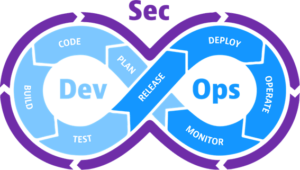
What is DevSecOps?
Heard about DevSecOps but not sure what it means?
Stay with us and learn what it is, why you should care about it and how to approach implementation.
Traditional security practices often won’t cut it in a modern IT environment. It takes more than generic guidelines and wishful thinking to build secure applications. That’s when DevSecOps steps in, a trending and essential practice that introduces security early in the software development life cycle. This is what it means, why it matters, and how to take the first steps towards implementing it. Here’s what you’ll learn:
- What is a DevSecOps?
- Why should you care about Deviascope?
- DevSecOps: how to implement
- DevSecOps: Taking the next step
What is a DevSecOps?
DevSecOps is a team organization method that combines development (Dev), security (SEC) and operations (Ops). Put simply, these functions work together at every stage of the software development cycle, from requirements identification to delivery. The goal is to integrate security into the very fabric of any piece of software. Traditionally a separate function, DevSecOps rings security to the forefront of development, a key concern for everyone involved. As a result, cybersecurity is not just an afterthought, but coexists with all other requirements.

In short, DevSecOps emerged as a process to develop software faster, safer and more aligned, involving three key areas from the onset of development.
Why should you care about DevSecOps?
It essential for businesses that put security first from the beginning of a project. Crucially, it represents a breaking point from the traditional view on software development: coders will code. Then, security teams come in to run all the checks before delivery (or worse, after delivery, leaving customers vulnerable to outside threats). The result? Technical debt, long delays, dubious code, rework – all of which are usually more expensive once the code is already in production.
Since DevSecOps handles security issues from the beginning of the project, it prevents these frictions from even occurring. Throughout the development cycle, code is reviewed, audited, verified, and tested for security issues. Development team fixes vulnerabilities as soon as they identify them, and this preventive action makes it possible to deliver an end product faster and complete.
In addition, it also allows you to build a more resilient system, where security is built-in by default rather than hastily added as a quick fix. On the other hand, DevSecOps gets things done more efficiently and cost-effective, as it is easier and less expensive to detect and fix vulnerabilities before they go into production than after release.
Also, a mature DevSecOps implementation will have solid automation, making the process repeatable and adaptable. This ensures that security is applied consistently, even as the environment changes and adapts to new requirements.
All things considered, DevSecOps is the kind of mindset that allows for quality, speed and scalability of projects, where everyone is responsible for security.
DevSecOps: how to implement
To implement DevSecOps, organizations must first include the security team in the design process so that their concerns are considered from the beginning of any project. Security experts are vital to identify potential hazards and provide suggestions to mitigate them, thus avoiding problems that may arise further down the road. The idea is to replace a reactive with a preventive attitude.
Next, it’s important to integrate some security tools throughout all stages of development. For instance, most DevSecOps teams will use some sort of debugger to check for code and design errors as they write them – rather than rely on someone to review their code for them. Also, it is important to check for new open-source vulnerabilities. Keeping an eye out for new entry points is also within DevSecOps and guess what – there are tools to do that as well.
When possible, the security verification process should be automated. Automation enables much better leverage of existing staff resources than manual processes, preventing security work from being a bottleneck to business KPIs.
DevSecOps: Taking the next step
So, loving the idea, but wondering how to take the next step? As with any change, it may seem overwhelming. That’s why you should rely on DevSecOps experts. At Near Partner, we are used to tackling challenges and always ready to upskill your security practices. Get in touch!





